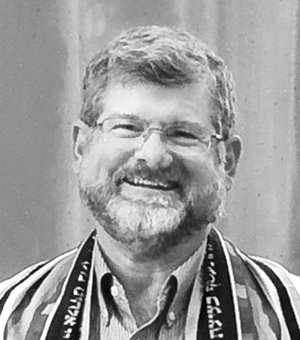During Sukkot, we see what is really real
All seven days we treat our sukkah as our regular dwelling and our house as our occasional dwelling.
– Mishnah Sukkah 2:9
There is an odd sense of peace that comes over me during Sukkot. I think it has to do with the fact that the sukkah itself is so obviously real. It is our most elaborate and massive ritual object.
You may not be able to convince yourself that a piece of matzah transforms you into a slave emerging from Egypt, or that a Hanukkah menorah shines with the light of a God’s miracles, but a sukkah definitely has the ability to convince you that you were made just to sit in it and feel at home.
As I stretch out in my sukkah for a festive meal, I think to myself, “Yes, this is the way life should be. I could sit in here forever and just be happy.”
And if, while sitting in my sukkah, I should happen to notice that nice, solid-looking building next to it – the one where I keep my bed, furnishings and books – I might think to myself, “Yes, that is my temporary shelter. It is a sort of out-building. An oversized shed. But this lovely hut with the roof made of branches – this is my real house. This is where I live.”
Sukkot is the holiday in which the unreal becomes palpably real. It is the premiere Jewish holiday of intentionally disorienting ourselves. We need it.
Think about this in terms of your own life. What is real to you? What do you see as the foundation of your life and existence? Is it a job or a social status? Is it wealth or prestige? Is it a role in the community? Is it a skill or a special ability?
Sukkot reminds us that all these things are fragile and disappear over time. Even our most valued relationships – family and friendships – can and will change, and eventually disappear. Most of the things we consider to be the foundation of our existence have no lasting reality or permanence.
This is the theme of the book of Kohelet (Ecclesiastes) that we read during Sukkot. Kohelet teaches, “I was distressed by all that goes on under the sun, because everything is futile and pursuit of wind” (2:17).
So, is anything real? What should we consider to be the foundation of our lives? Kohelet’s answer is enigmatic.
“I realized that the only worthwhile thing there is,” says Kohelet, “is to be happy and to do what is good in life. And also that whenever you eat or drink, that you see good in your work, see that it is all a gift of God” (3:12-13).
The only thing that is permanent – the only thing that is “really real” – is our ability to live life with happiness, appreciation and reverence for the presence of divinity in each moment. That is the only thing that is timeless. Everything else is transitory.
Sukkot is an invitation to reorient our lives along the trajectory of timeless acceptance of the moment we inhabit right now. While we dwell in the sukkah, there is no past – which is just a memory – and there is no future, which is just a speculation. There is only now – a now in which we realize that just breathing and living is a miracle, a now in which there is nothing to do but to experience the joy of loving and being loved, giving thanks for what we have, and knowing ourselves to be blessed. What a spectacular holiday!
In this way, we may see Sukkot as the antidote to the other Tishrei holidays. From Rosh Hashanah to Yom Kippur, we lived in a reality of God’s judgment, and we weighed ourselves against an idealized version of who we might be. We entered deeply into regret and resolutions to change our ways. That’s all over now. We are done with that until next year. Now we cleanse ourselves with the warm embrace of a holiday that only cares about joy, and in which God is only a source of love.
We need this. Sukkot disorients us into remembering that the things that are most real in life are the things that we usually think of as fleeting and ephemeral – acceptance, enjoyment, appreciation and love. Sukkot invites us into a topsy-turvy world in which huts with loose branches for a roof are permanent, and steel-framed buildings with poured-concrete foundations are temporary. It does this so we can see what is really real.
Moadim l’simcha, chagim uzmanim lesason! May these days bring you joy. May these festivals and seasons bring happiness to you!
RABBI JEFFREY GOLDWASSER is the spiritual leader of Temple Sinai, in Cranston.








